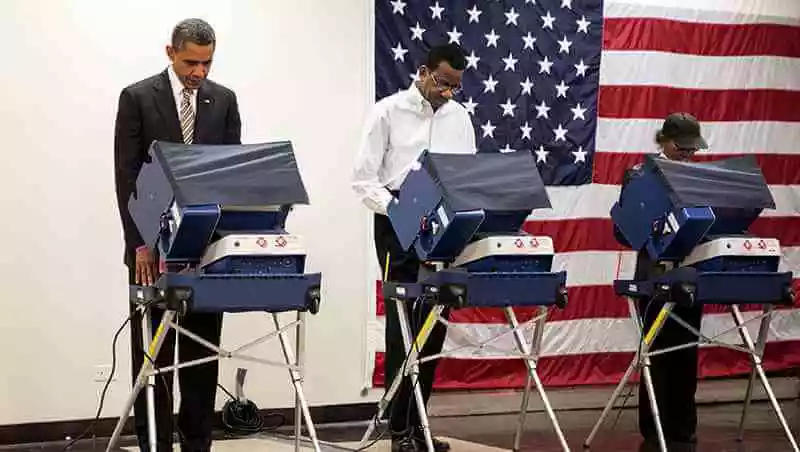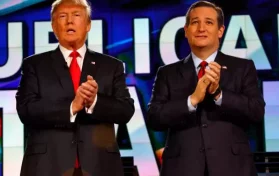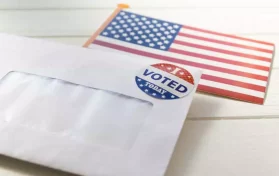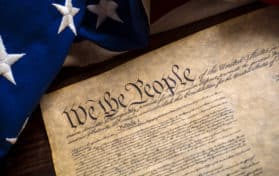
Elections are events whose significance goes far beyond candidates and political parties. They are periods when citizens cast their votes and decide the next person to lead them.
Elections are and would always be a game of numbers. The candidate with more votes from the Electoral College wins the election.
Furthermore, there are laws governing elections. And candidates and even electorates are expected to know and follow them.
Now, here’s one question that has confused a couple of people.
Can presidential candidates vote for themselves?
Yes, they can. It might not be the case in other country’s democratic elections. But it is in the United States of America’s presidential elections.
Presidential candidates are citizens too. So they have the right to vote and have others vote for them. They’re also of the legal age to seek political office and vote.
So, presidential candidates can vote for themselves in an election. But then, this is possible for candidates that registered in their hometown.
Presidential candidates can travel to the voting center and vote like everyone else. But they cannot do certain things on Election Day before or after voting.
Candidates cannot campaign for votes or disrupt the voting process.
Alright, that’s the response to the question. But there’s still more, so keep reading!
Can Presidential Candidates Decide Not To Vote For Themselves?
The winner of an election is decided by the number of votes obtained. It’s not by who was outspoken on social media or lamented the most to the press.
Voting is also by choice, though it’s the right of every citizen. Once you’re 18 years, you’re eligible to vote.
So, can presidential candidates decide against voting for themselves? Yes, they can! Unfortunately, that hasn’t happened before and may not occur.
The reason presidential candidates cannot decide against voting for themselves is simple. You cannot expect others to like you when you don’t like yourself.
The press always accompanies presidential candidates and other notable personalities to election venues. Thus, if a presidential candidate decides against voting, people may read a different meaning to it.
You may be surprised to hear claims that a presidential candidate didn’t vote for himself because he doesn’t believe in himself. Several other allegations might creep in too.
We should also not forget that it takes a huge amount of funds to organize campaigns and project candidates. So, presidential elections are more than the candidates themselves.
Party members invest heavily in elections. They invest time and money to make their presidential nominees successful. Thus, they’ll kick against any decision that would jeopardize that.
Can You See Who Presidential Candidates Voted For?
No, you cannot. Even a presidential candidate cannot request to see the candidate you’re voting for. It is illegal and considered an electoral fraud.
In the same vein, family members cannot force you to vote for a candidate. It is your ballot and your vote. You alone decide your candidate of choice.
It doesn’t matter if the presidential candidate voting is the sitting president (running for office for the second term). Everyone has equal rights on Election Day. Your vote decides presidential candidates’ fate.
With that said, presidential candidates are expected to travel to their respective voting jurisdiction, cast their votes, and leave quietly. They cannot expose their completed ballot paper or question people to know who they gave their votes to.
What is the Legal Age for Presidential Candidates?
The Article II of the United States Constitution states the age of candidacy of presidential candidates.
You must be at least 35 years of age to run for president.
Here are other requirements:
- You must have lived in the U.S. for at least 14 years
- Presidential candidates have to be natural-born citizens of the U.S.
Is there a maximum age to run for president? The U.S. Constitution states the minimum age to run for the presidency is 35. Unfortunately, those that drafted the constitution didn’t state a certain age limit.
Over 40 years ago, Ronald Regan was the oldest person to become U.S. President. The 40th U.S. President was 69 when he entered the office and turned 70 a month after.
Today, other presidents have broken that record. Donald Trump was 70 when he entered office, and today, the 46th President, Joe Biden, is 78 years old.
So, it seems Americans would continue to see septuagenarians occupy the oval office in a long while. The constitution doesn’t favor younger people.
We can all agree that people of this present dispensation live healthier and longer. But let’s not forget that mental and physical state declines, as people get older.
Another question is this. How is it that 18 years is the legal voting age but not a suitable age to run for president? Well, let’s say people of this age still have much to learn. What about 25 year’s olds?
Why is 35 years the age limit, and not 25? What’s the basis of establishing such a limit?
For the record, many 25 years old adults behave more mature and have great leadership skills than 35years olds.
So, there should be a constitutional review. We also need to propose a more logical age limit for people to run for president.
There’s so much pressure in the oval office, and letting a septuagenarian run such a highly-demanding job might not be the best decision for the country.
America needs younger leaders. The country needs people who can think and make quick decisions. We need young leaders who can handle the demands posed by such a political office, not one that spends days away from the office for one health-related reason or another.
Can Presidential Candidates Campaign On Election Day?
No, candidates cannot campaign during elections. It doesn’t matter who the presidential candidate is.
Campaigns are efforts made by political parties to persuade voters to consider voting for their candidates. It is an important process in the journey to the White House.
In the U.S., electoral campaigns have official dates. The information usually comes with campaign restrictions or regulations, renting venues, and others.
Do Presidential Candidates Get Paid?
Yes, presidential candidates can receive salaries from their campaign committee. The money is usually from the contributions to fund the election.
The Federal Election Commission rules support the payment of salary to presidential candidates. But that can only take place under certain conditions.
However, please note that the amount presidential candidates receive won’t be higher than the salary from their last jobs or the average annual salary of the office in question. You’ll be paid whichever is less between both options.
For presidential candidates, the annual salary for presidents is $400,000. And note that you will only receive half of your salary from the committee when you quit six months into the race.
Does every presidential candidate get paid? No.
If you’re an incumbent president, a senator, or a house of representative member running for president, the FEC rule is that you won’t get paid.
Barack Obama, Ron Paul, and Dennis Kucinich didn’t receive a dime from their campaign committees. Why? They were already getting paid for the political office they held.
FEC made this rule so that newcomers could rub shoulders with other candidates. The commission understands the financial burden most candidates might face after quitting their full-time job to run for president.
Conclusion
Can presidential candidates vote for themselves? Yes, they can. However, it is not acceptable for presidential candidates or party members to organize campaigns on Election Day.
The FEC (Federal Election Commission) schedules election campaigns. So there’s time for campaigns and time for the election.
We also mentioned that a presidential candidate could vote provided they registered in their home state. You can only vote where you registered.





